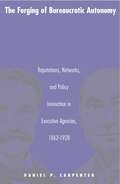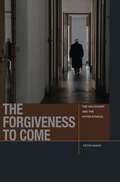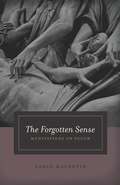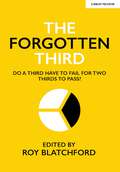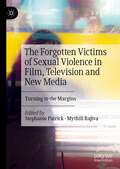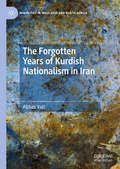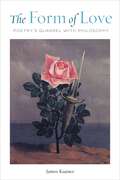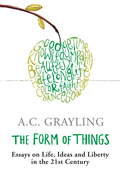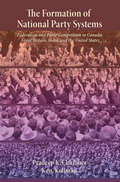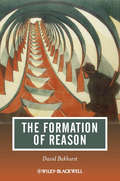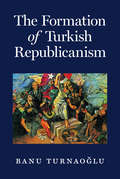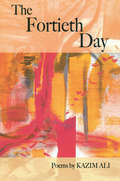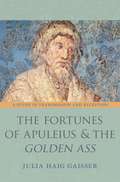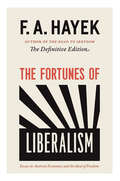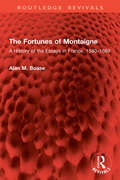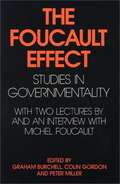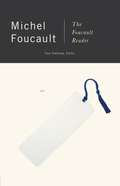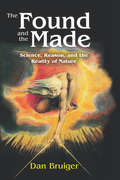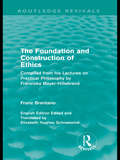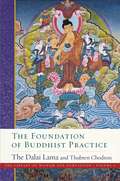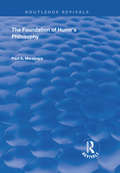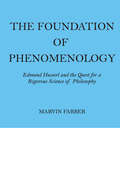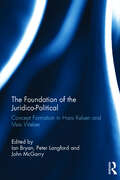- Table View
- List View
The Forging of Bureaucratic Autonomy: Reputations, Networks, and Policy Innovation in Executive Agencies, 1862-1928 (Princeton Studies in American Politics: Historical, International, and Comparative Perspectives #173)
by Daniel CarpenterUntil now political scientists have devoted little attention to the origins of American bureaucracy and the relationship between bureaucratic and interest group politics. In this pioneering book, Daniel Carpenter contributes to our understanding of institutions by presenting a unified study of bureaucratic autonomy in democratic regimes. He focuses on the emergence of bureaucratic policy innovation in the United States during the Progressive Era, asking why the Post Office Department and the Department of Agriculture became politically independent authors of new policy and why the Interior Department did not. To explain these developments, Carpenter offers a new theory of bureaucratic autonomy grounded in organization theory, rational choice models, and network concepts. According to the author, bureaucracies with unique goals achieve autonomy when their middle-level officials establish reputations among diverse coalitions for effectively providing unique services. These coalitions enable agencies to resist political control and make it costly for politicians to ignore the agencies' ideas. Carpenter assesses his argument through a highly innovative combination of historical narratives, statistical analyses, counterfactuals, and carefully structured policy comparisons. Along the way, he reinterprets the rise of national food and drug regulation, Comstockery and the Progressive anti-vice movement, the emergence of American conservation policy, the ascent of the farm lobby, the creation of postal savings banks and free rural mail delivery, and even the congressional Cannon Revolt of 1910.
The Forgiveness to Come: The Holocaust and the Hyper-Ethical (Just Ideas)
by Peter Jason BankiThis book is concerned with the aporias, or impasses, of forgiveness, especially in relation to the legacy of the crimes against humanity perpetrated by the Nazis and their collaborators during World War II. Banki argues that, while forgiveness of the Holocaust is and will remain impossible, we cannot rest upon that impossibility. Rather, the impossibility of forgiveness must be thought in another way. In an epoch of “worldwidization,” we may not be able simply to escape the violence of scenes and rhetoric that repeatedly portray apology, reconciliation, and forgiveness as accomplishable acts. Accompanied by Jacques Derrida’s thought of forgiveness of the unforgivable, and its elaboration in relation to crimes against humanity, the book undertakes close readings of literary, philosophical, and cinematic texts by Simon Wiesenthal, Jean Améry, Vladimir Jankélévitch, Robert Antelme and Eva Mozes Kor. These texts contend with the idea that the crimes of the Nazis are inexpiable, that they lie beyond any possible atonement or repair. Banki argues that the juridical concept of crimes against humanity calls for a thought of forgiveness—one that would not imply closure of the infinite wounds of the past. How could such a forgiveness be thought or dreamed? Banki shows that if today we cannot simply escape the “worldwidization” of forgiveness, then it is necessary to rethink what forgiveness is, the conditions under which it supposedly takes place, and especially its relation to justice.
The Forgotten Sense: Meditations on Touch
by Pablo MauretteOf all the senses, touch is the most ineffable—and the most neglected in Western culture, all but ignored by philosophers and artists over millennia. Yet it is also the sense that links us most intimately to the world around us, from our mother’s caress when we’re born to the gentle lowering of our eyelids after death. The Forgotten Sense gives touch its due, addressing it in multifarious ways through a series of six essays. Literary in feel, ambitious in conception, admirable in their range of reference and insight, these meditations address questions fundamental to the understanding of touch: What do we mean when we say that an artwork touches us? How does language affect our understanding of touch? Is the skin the deepest part of the human body? Can we philosophize about a kiss? To aid him in answering these questions, Pablo Maurette recruits an impressive roster of cultural figures from throughout history: Homer, Lucretius, Chrétien de Troyes, Melville, Sir Thomas Browne, Knausgaard, Michel Henry and many others help him unfurl the underestimated importance of the sense of touch and tactile experience. The resulting book is essay writing at its best—exploratory, surprising, dazzling, a reading experience like no other. You will come away from it with a new appreciation of touch, and a new way of understanding our interactions with the world around us.
The Forgotten Third: Do One Third Have To Fail For Two Thirds To Succeed?
by Roy Blatchford'The Forgotten Third' is a provocative collection of essays which poses the fundamental question: 'Do a third of school students have to fail so that two-thirds can pass?'Roy Blatchford has brought together a group of leading thinkers and influencers in UK education to address this question - and pose some answers.Featuring contributions from: Caroline Barlow, Geoff Barton, Rebecca Boomer-Clark, Peter Collins, Tim Coulson, Kiran Gill, Miranda Green, Peter Hyman, David Laws, Rachel Macfarlane, Rupert Moreton, Harmer Parr, Marc Rowland, Catherine Sezen, Richard Sheriff, Nic Taylor-Mullins and Iain Veitch.'The Forgotten Third' challenges orthodoxies to shape a 'levelled up' education system.
The Forgotten Victims of Sexual Violence in Film, Television and New Media: Turning to the Margins
by Stephanie Patrick Mythili RajivaThis edited collection provides an intersectional and transnational exploration of representations of sexual violence and rape within films, television shows, and digital media in the contemporary context of the #MeToo and #TimesUp movements. Drawing upon sociology, gender studies, cultural studies, media studies, and Black feminist studies, chapters focus on women and texts at the margins of mainstream culture’s depictions of sexual violence. The editors and contributors examine the dominant narrative of the thin, cisgender, heterosexual white female victim, and the ways in which social and cultural conversations around race and gender impact and are impacted by depictions of sexual violence in media. This book will be of interest to scholars and students in sociology, gender studies, and media studies, particularly those interested in the intersectionality of race and gender.Chapter 1 is available open access under a Creative Commons Attribution 4.0 International License via link.springer.com.
The Forgotten Years of Kurdish Nationalism in Iran (Minorities in West Asia and North Africa)
by Abbas ValiThis book investigates the forgotten years of Kurdish nationalism in Iran, from the fall of the Kurdish republic to the advent of the Iranian revolution. An original and path-breaking investigation of the period, it sheds light not only on the historical specificity of the phenomenon of nationalism in exile, but also on the political processes and practices defining the development of Kurdish nationalism in the post-revolutionary era. Although nationalist landmarks such as the Kurdish republic in 1946 and the resurgence of the movement in the revolutionary conjuncture of 1978-79 have attracted the attention of historians and social scientists in recent years, little is known about the three decades of Kurdish nationalism in exile between these two events. This analysis draws on contemporary poststructuralist theory to question the concept of the minority in democratic and constitutional theory, arguing that it is an effect of the discursive linkage between sovereign power and the dominant ethnic-linguistic identity in the nation-state. This text will appeal to a wide academic audience ranging from the fields of Kurdish, Iranian and Middle East Studies to ethnicity, nationalism, government, and political science.
The Form of Love: Poetry’s Quarrel with Philosophy
by James KuznerCan poetry articulate something about love that philosophy cannot? The Form of Love argues that it can. In close readings of seven “metaphysical” poems, the book shows how poets of the early modern period and beyond use poetic form to turn philosophy to other ends, in order not to represent the truth about love but to create a virtual experience of love, in all its guises. The Form of Love shows how verse creates love that can’t exist without poetry’s specific affordances, and how poems can, in their impossibility, prompt love’s radical re-imagining. Like the philosophies on which they draw, metaphysical poems imagine love as an intense form of non-sovereignty, of giving up control. They even imagine love as a liberating bondage—to a friend, a beloved, a saint, a God, or a garden. Yet these poems create strange, striking versions of such love, made in, rather than through, the devices, structures, and forces where love appears.Tracing how poems think, Kuzner argues, requires an intimate form of reading: close—even too close—attention to and thinking with the text. Showing how poetry thinks of love otherwise than other fields, the book reveals how poetry and philosophy can nevertheless enter into a relation that is itself like love.
The Form of Things: Essays on Life, Ideas and Liberty
by A. C. GraylingThe bestseller from our pre-eminent philosopher, A.C. Grayling'Grief and loneliness, depression, despair and failure - those things are the common human lot at least at times in all our lives'. Yet it is philosophy which, while not providing an answer to these problems, can enable us to prepare for them, and create strategies with which to deal with them. It is only through reflecting upon the world around us, reading, thinking, questioning, enjoying, that we can inculcate understanding, tolerance and importantly the courage to live our lives. It is our responsibility to live such 'considered lives' and to realise that we are authors of a narrative that can be shaped and controlled.This is the fifth in a series of essay miscellanies from our foremost philosopher A.C. Grayling, reflecting upon the form of our world and its multiplicity. The essays are grouped by theme into reflections upon life and the standards we live by, including vivid polemics and perceptive pieces on significant thinkers, contemporary rights and liberties issues. This book brilliantly articulates the philosophical debate and reflection that is needed to prepare us for life in the twenty-first century.
The Form of Things: Essays on Life, Ideas and Liberty
by Prof A.C. GraylingThe bestseller from our pre-eminent philosopher, A.C. Grayling'Grief and loneliness, depression, despair and failure - those things are the common human lot at least at times in all our lives'. Yet it is philosophy which, while not providing an answer to these problems, can enable us to prepare for them, and create strategies with which to deal with them. It is only through reflecting upon the world around us, reading, thinking, questioning, enjoying, that we can inculcate understanding, tolerance and importantly the courage to live our lives. It is our responsibility to live such 'considered lives' and to realise that we are authors of a narrative that can be shaped and controlled.This is the fifth in a series of essay miscellanies from our foremost philosopher A.C. Grayling, reflecting upon the form of our world and its multiplicity. The essays are grouped by theme into reflections upon life and the standards we live by, including vivid polemics and perceptive pieces on significant thinkers, contemporary rights and liberties issues. This book brilliantly articulates the philosophical debate and reflection that is needed to prepare us for life in the twenty-first century.
The Formation of National Party Systems: Federalism and Party Competition in Canada, Great Britain, India, and the United States
by Pradeep Chhibber Ken KollmanPradeep Chhibber and Ken Kollman rely on historical data spanning back to the eighteenth century from Canada, Great Britain, India, and the United States to revise our understanding of why a country's party system consists of national or regional parties. They demonstrate that the party systems in these four countries have been shaped by the authority granted to different levels of government. Departing from the conventional focus on social divisions or electoral rules in determining whether a party system will consist of national or regional parties, they argue instead that national party systems emerge when economic and political power resides with the national government. Regional parties thrive when authority in a nation-state rests with provincial or state governments. The success of political parties therefore depends on which level of government voters credit for policy outcomes. National political parties win votes during periods when political and economic authority rests with the national government, and lose votes to regional and provincial parties when political or economic authority gravitates to lower levels of government. This is the first book to establish a link between federalism and the formation of national or regional party systems in a comparative context. It places contemporary party politics in the four examined countries in historical and comparative perspectives, and provides a compelling account of long-term changes in these countries. For example, the authors discover a surprising level of voting for minor parties in the United States before the 1930s. This calls into question the widespread notion that the United States has always had a two-party system. In fact, only recently has the two-party system become predominant.
The Formation of Reason (Journal Of Philosophy Of Education Ser. #16)
by David BakhurstIn The Formation of Reason, philosophy professor David Bakhurst utilizes ideas from philosopher John McDowell to develop and defend a socio-historical account of the human mind. Provides the first detailed examination of the relevance of John McDowell's work to the Philosophy of Education Draws on a wide-range of philosophical sources, including the work of 'analytic' philosophers Donald Davidson, Ian Hacking, Peter Strawson, David Wiggins, and Ludwig Wittgenstein Considers non-traditional ideas from Russian philosophy and psychology, represented by Ilyenkov and Vygotsky Discusses foundational philosophical ideas in a way that reveals their relevance to educational theory and practice
The Formation of Turkish Republicanism
by Banu TurnaoğluTurkish republicanism is commonly thought to have originated with Mustafa Kemal Atatürk and the founding of modern Turkey in 1923, and understood exclusively in terms of Kemalist ideals, characterized by the principles of secularism, nationalism, statism, and populism. Banu Turnaoğlu challenges this view, showing how Turkish republicanism represents the outcome of centuries of intellectual dispute in Turkey over Islamic and liberal conceptions of republicanism, culminating in the victory of Kemalism in the republic's formative period.Drawing on a wealth of rare archival material, Turnaoğlu presents the first complete history of republican thinking in Turkey from the birth of the Ottoman state to the founding of the modern republic. She shows how the Kemalists wrote Turkish history from their own perspective, presenting their own version of republicanism as inevitable while disregarding the contributions of competing visions. Turnaoğlu demonstrates how republicanism has roots outside the Western political experience, broadening our understanding of intellectual history. She reveals how the current crises in Turkish politics—including the Kurdish Question, democratic instability, the rise of radical Islam, and right-wing Turkish nationalism—arise from intellectual tensions left unresolved by Kemalist ideology.A breathtaking work of scholarship, The Formation of Turkish Republicanism offers a strikingly new narrative of the evolution and shaping of modern Turkey.
The Fortieth Day (American Poets Continuum)
by Kazim AliFrom the Bible to the Quaraan, the fortieth day symbolizes the last moment before deliverance, a moment in time when a supplicant or prophet or stormbeaten passenger knows there is no state &“after,&” but finally accepts the present state as a permanent one.In The Fortieth Day, Kazim Ali follows the fractured narratives and moving lyrics of his debut collection, The Far Mosque, with a deeply spiritual and meditative book exploring the rhetoric of prayer.Kazim Ali was born in the United Kingdom and raised in an Islamic household. He holds degrees from the University at Albany and New York University. He lives in Oberlin, Ohio.
The Fortunes of Apuleius and the Golden Ass: A Study in Transmission and Reception (Martin Classical Lectures #32)
by Julia Haig GaisserThis book traces the transmission and reception of one of the most influential novels in Western literature. The Golden Ass, the only ancient Roman novel to survive in its entirety, tells of a young man changed into an ass by magic and his bawdy adventures and narrow escapes before the goddess Isis changes him back again. Its centerpiece is the famous story of Cupid and Psyche. Julia Gaisser follows Apuleius' racy tale from antiquity through the sixteenth century, tracing its journey from roll to codex in fourth-century Rome, into the medieval library of Monte Cassino, into the hands of Italian humanists, into print, and, finally, over the Alps and into translation in Spanish, French, German, and English. She demonstrates that the novel's reception was linked with Apuleius' reputation as a philosopher and the persona he projected in his works. She relates Apuleius and the Golden Ass to a diverse cast of important literary and historical figures--including Augustine, Fulgentius, Petrarch, Boccaccio, Bessarion, Boiardo, and Beroaldo. Paying equal attention to the novel's transmission (how it survived) and its reception (how it was interpreted), she places the work in its many different historical contexts, examining its representation in art, literary imitation, allegory, scholarly commentary, and translation. The volume contains several appendixes, including an annotated list of the manuscripts of the Golden Ass. This book is based on the author's Martin Classical Lectures at Oberlin College in 2000.
The Fortunes of Liberalism: Essays on Austrian Economics and the Ideal of Freedom (The Collected Works of F. A. Hayek #4)
by F. A. HayekFrom a Nobel Laureate economist, essays on classical liberalism as illustrated by the Austrian school of political economy. The Reagan and Thatcher &“revolutions.&” The collapse of Eastern Europe dramatically captured in the tearing down of the Berlin Wall. F. A. Hayek, &“grand old man of capitalism&” and founder of the classical liberal, free-market revival which ignited and inspired these world events, forcefully predicted their occurrence in writings such as The Road to Serfdom, first published in 1944. Hayek&’s well-known social and political philosophy—in particular his long-held pessimistic view of the prospects of socialism, irrefutably vindicated by the collapse of the Eastern bloc—is fully grounded in the Austrian approach to economics. In this collection, Hayek traces his intellectual roots to the Austrian school, the century-old tradition founded at the University of Vienna by Carl Menger, and links it to the modern rebirth of classical liberal or libertarian thought. As Hayek reminds us, the cornerstone of modern economics—the theory of value and price—&”represents a consistent continuation of the fundamental principles handed down by the Vienna school.&” Here, in this first modern collection of essays on the Austrian school by one of its preeminent figures, is the genesis of this tradition and its place in intellectual history. Two hitherto unavailable memoirs, &“The Economics of the 1920s as Seen from Vienna,&” published here for the first time, and &“The Rediscovery of Freedom: Personal Recollections,&” available for the first time in English, make this collection invaluable for Hayek scholars.
The Fortunes of Montaigne: A History of the Essays in France, 1580–1669 (Routledge Revivals)
by Alan M. BoaseMontaigne’s Essays were republished in France every two or three years from 1580–1669. The Fortunes of Montaigne (originally published in 1935) aims to show what those who bought these Essays during that period sought or found there.The author has attempted to answer three questions in the volume—what are the general ideas of those who are particularly drawn to Montaigne or who write against him?; what did these writers think of the Essays, and what specially interested them in the book?; and what did they borrow from him, or more profitably, what are their less conscious borrowings, their adaptations of his ideas? The book gives an account of the criticism and appreciation of the Essays. Further, it discusses the development of Humanism as opposed to orthodox Christianity, and the part played by the Essays in that development.This book will be of interest to students and researchers of philosophy, history, and literature.
The Foucault Effect
by Colin Gordon Peter Miller Graham BurchellBased on Michel Foucault's 1978 and 1979 lectures at the Collège de France on governmental rationalities and his 1977 interview regarding his work on imprisonment, this volume is the long-awaited sequel to Power/Knowledge. In these lectures, Foucault examines the art or activity of government both in its present form and within a historical perspective as well as the different ways governmentality has been made thinkable and practicable. Foucault's thoughts on political discourse and governmentality are supplemented by the essays of internationally renowned scholars. United by the common influence of Foucault's approach, they explore the many modern manifestations of government: the reason of state, police, liberalism, security, social economy, insurance, solidarity, welfare, risk management, and more. The central theme is that the object and the activity of government are not instinctive and natural things, but things that have been invented and learned. The Foucault Effect analyzes the thought behind practices of government and argues that criticism represents a true force for change in attitudes and actions, and that extending the limits of some practices allows the invention of others. This unique and extraordinarily useful collection of articles and primary materials will open the way for a whole new set of discussions of the work of Michel Foucault as well as the status of liberalism, social policy, and insurance.
The Foucault Reader
by Michel FoucaultMichel Foucault was one of the most influential thinkers in the contemporary world, someone whose work has affected the teaching of half a dozen disciplines ranging from literary criticism to the history of criminology. But of his many books, not one offers a satisfactory introduction to the entire complex body of his work. The Foucault Reader was commissioned precisely to serve that purpose. The Reader contains selections from each area of Foucault's work as well as a wealth of previously unpublished writings, including important material written especially for this volume, the preface to the long-awaited second volume of The History of Sexuality, and interviews with Foucault himself, in the course of which he discussed his philosophy at first hand and with unprecedented candor. This philosophy comprises an astonishing intellectual enterprise: a minute and ongoing investigation of the nature of power in society. Foucault's analyses of this power as it manifests itself in society, schools, hospitals, factories, homes, families, and other forms of organized society are brought together in The Foucault Reader to create an overview of this theme and of the broad social and political vision that underlies it. Edited by Paul Rabinow.
The Found and the Made: Science, Reason, and the Reality of Nature
by Dan BruigerThis book critically examines how mathematical modelling shapes and limits a scientific approach to the natural world and affects how society views nature. It questions concepts such as determinism, reversibility, equilibrium, and the isolated system, and challenges the view of physical reality as passive and inert. Dan Bruiger argues that if nature is real, it must transcend human representations. In particular, it can be expected to self-organize in ways that elude a mechanist treatment.This interdisciplinary study addresses several key areas: the "crisis" in modern physics and cosmology; the limits and historical, psychological, and religious roots of mechanistic thought; and the mutual effects of the scientific worldview upon society's relationship to nature. Bruiger demonstrates that there is still little place outside biology for systems that actively self-organize or self-define. Instead of appealing to "multiverses" to resolve the mysteries of fine-tuning, he suggests that cosmologists look toward self-organizing processes. He also states that physics is hampered by its external focus and should become more self-reflective. If scientific understanding can go beyond a stance of prediction and control, it could lead to a relationship with nature more amenable to survival.The Found and the Made fills a void between popular science writing and philosophy. It will appeal to naturalists, environmentalists, science buffs, professionals, and students of cultural history, evolutionary psychology, gender studies, and philosophy of mind.
The Foundation and Construction of Ethics
by Franz BrentanoChosen and edited by Franziska Mayer-Hillebrand, translated by Elizabeth Hughes Schneewind, this collection of essays reflects Brentano's lectures at the University of Vienna from 1876 to 1894.
The Foundation and Construction of Ethics (Routledge Revivals)
by Franz BrentanoExpanding on the theory of ethics first posited by Brentano in The Origin of our Knowledge of Right and Wrong this re-issued work, first published posthumously in 1952, is based on series of lectures on practical philosophy, given at the university of Vienna from 1876 to 1894. The English-speaking reader will find it interesting to examine the step-by-step development of Brentano’s ethical theory, his extensive critique of British moral philosophers, and his unusually detailed section on casuistry.
The Foundation of Buddhist Practice (The Library of Wisdom and Compassion #1)
by His Holiness the Dalai Lama Venerable Thubten ChodronThe second volume in the Dalai Lama’s definitive and comprehensive series on the stages of the Buddhist path, The Library of Wisdom and Compassion. Volume 1, Approaching the Buddhist Path, contained introductory material that set the context for Buddhist practice. This second volume describes the foundation—the important teachings that will help us establish a flourishing Dharma practice. Traditional presentations of the path in Tibetan Buddhism assume the audience already has faith in the Buddha and believes in rebirth and karma, but the Dalai Lama realized early on that a different approach was needed for his Western students. Starting with the four seals and the two truths, His Holiness illuminates key Buddhist ideas, such as dependent arising and emptiness, to support the reader in engaging with this rich tradition. This second volume in the new Library of Wisdom and Compassion series provides a wealth of reflections on Buddhist history and fundamentals, contemporary issues, and the Dalai Lama’s own personal experiences.
The Foundation of Hume's Philosophy (Routledge Revivals)
by Paul A. MwaipayaFirst published in 1999, this volume endeavours to determine the coherence of David Hume’s philosophical system. That is, to show that Hume’ philosophy is founded upon nothing but his doctrine of belief, from which the entirety of Hume’s philosophy may ultimately be derived. Paul A. Mwaipaya demonstrates the coherence of Hume’s thoughts in order to show where it has been misunderstood and to dissolve confusing interpretations of Hume’s philosophy. This ultimate commonality is derived through examinations of Hume’s general theory of perception, Hume’s theory of knowledge and probability and Hume’s theory of passions and morality.
The Foundation of Phenomenology: Edmund Husserl and the Quest for a Rigorous Science of Philosophy
by Marvin FarberIn this widely hailed and long out of print classic of twentieth century philosophic commentary, Professor Farber explains the origin, development, and function of phenomenology with a view towards its significance for philosophy in general.The book offers a general account of Husserl and the background of his philosophy. The early chapters are devoted to his mathematical-philosophical and psychological studies. The refutation of psychologism is present in detail, together with the critical reaction to it. The development of his logical theories in the light of contemporary literature at the close of the 19th century is next considered. The main content of the six Logical Investigations follows, which contribute to the phenomenological elucidation of experience and knowledge. The phenomenological philosophy of logic as developed in Husserl's later writings is then introduced, followed by a discussion of the phenomenological method and its proper function. Farber makes clear his preference for phenomenology as a purely descriptive method and his opposition to have it serve as a last stronghold of metaphysics.Indispensable as groundwork for descriptive philosophical study, this book will deeply interest not only serious students of philosophy and psychology, but also those who are concerned with the philosophical aspects of mathematics, social and natural sciences, law and psychiatry.
The Foundation of the Juridico-Political: Concept Formation in Hans Kelsen and Max Weber
by Peter Langford Ian Bryan John McGarryHans Kelsen and Max Weber are conventionally understood as initiators not only of two distinct and opposing processes of concept formation, but also of two discrete and contrasting theoretical frameworks for the study of law. The Foundation of the Juridical-Political: Concept Formation in Hans Kelsen and Max Weber places the conventional understanding of the theoretical relationship between the work of Kelsen and Weber into question. Focusing on the theoretical foundations of Kelsen’s legal positivism and Weber’s sociology of law, and guided by the conceptual frame of the juridico-political, the contributors to this interdisciplinary volume explore convergences and divergences in the approach and stance of Kelsen and Weber to law, the State, political science, modernity, legal rationality, legal theory, sociology of law, authority, legitimacy and legality. The chapters comprising The Foundation of the Juridical-Political uncover complexities within as well as between the theoretical and methodological principles of Kelsen and Weber and, thereby, challenge the enduring division between legal positivism and the sociology of law in contemporary discourse.
